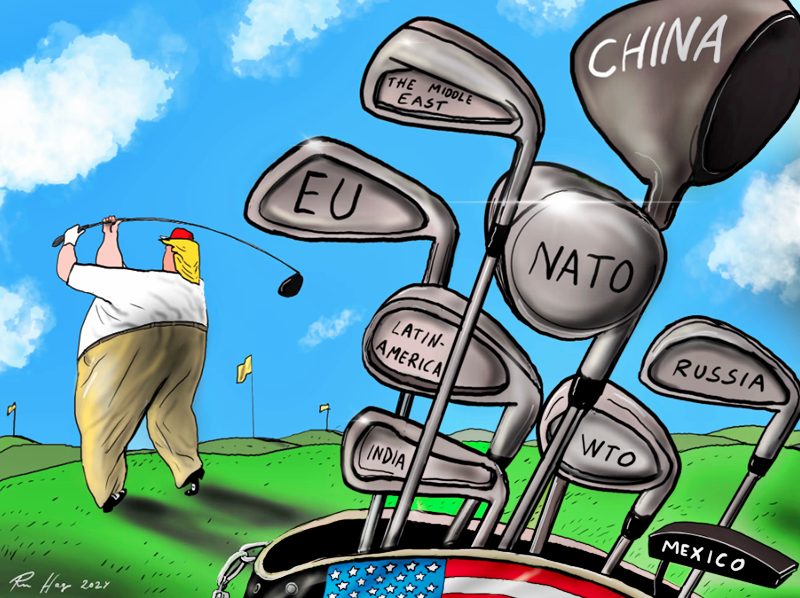Donald Trump's potential returning to political power

By VG- Per Olav Oedegaard-Human Synthesis- 09 November 2024- 14.43
This article sheds light on the international anticipation and concern surrounding Donald Trump's potential return to political power, painting a picture of heightened political tensions and strategic recalibrations across the globe.
His polarizing figure evokes both anxiety and cautious optimism, with world leaders revisiting alliances and policies to brace for the possible seismic shifts in U.S. foreign relations. Trump's brand of leadership, marked by admiration for "strong men" leaders, has positioned him as a champion of direct action and unilateral decisions.
His promises of swift peace settlements, especially in Ukraine and the Middle East, resonate with the regions' power players—eliciting cautious optimism in Moscow and Jerusalem but stirring unease in Kyiv and among Western allies. As Biden's steady transatlantic approach has drawn sighs of relief in Europe, the prospect of Trump returning prompts a mix of apprehension and adaptation, particularly from European allies who anticipate more transactional diplomacy and unpredictability.
A major aspect of Trump’s prospective approach is his protectionist economic stance. Trump's trade policies underscore a commitment to American self-sufficiency, with a strict zero-sum perspective on trade. He views international commerce as a game of winners and losers, with trade deficits interpreted as America being taken advantage of.
This worldview drives his advocacy for high tariffs, designed to shield American industries but with potential inflationary consequences for U.S. consumers. This inward focus also raises fears of a trade war, especially with China, and could adversely impact allies like Norway, which relies on open trade with both Europe and the U.S.
Trump’s return could place European countries in a delicate position, forcing them to balance between upholding strong transatlantic ties and navigating the unpredictable nature of his foreign policy. For countries like Norway, which is used to cooperating closely with the U.S. on security and intelligence, maintaining a stable relationship with the U.S. remains crucial.
However, the Trump administration’s previous disdain for multilateral agreements and skepticism toward international organizations foreshadows challenges for small, trade-dependent nations like Norway, which rely on a rules-based global trade system.
In the Middle East, Trump's influence could reignite support for Israel under Netanyahu, especially on contentious issues like territorial annexation, while his rapport with Saudi Arabia might spur shifts in regional alliances.
Yet Trump's overarching focus on a strongman approach could complicate peace efforts, with his peace vision often perceived as one that aligns more with U.S. allies' terms, particularly those of authoritarian allies. The administration’s approach may well impact longstanding conflict zones, such as Gaza, where Trump’s "peace through strength" ethos resonates unevenly across the political spectrum.
Trump’s overt promises of strength and resolve are a stark contrast to Biden’s collaborative diplomacy. He has repeatedly signaled a readiness to end conflicts quickly, often with bold claims to secure peace within days. Yet the fear among Western nations and Ukraine is that this could lead to concessions favoring authoritarian regimes, particularly if Trump's peace terms for Ukraine would involve territorial compromise or enforced neutrality.
This duality of anxiety and expectation underscores the broader uncertainty that Trump’s potential leadership represents. As the international community steels itself for what might be a renewed era of unpredictability, countries globally are positioning themselves, cautiously preparing to adapt to the whirlwind of change a Trump presidency could bring.
In a world marked by shifting alliances, increasing global interdependencies, and the overarching need for stability, the approach each country takes could shape the future of international relations significantly in the years to come.
In reflecting on the potential return of a leader like Trump to global politics, we are reminded of the philosophical tension between strength and wisdom, power and cooperation. The desire for strong, decisive leadership taps into an age-old human impulse—the allure of control, of order imposed swiftly. Yet, as history shows, the exercise of power without balance often leads to unintended consequences, reshaping not only nations but also the human relationships that undergird peace and trust.
In the political sphere, strength alone does not guarantee stability or justice. True strength lies not only in assertiveness but in the capacity to understand and mediate between the nuanced needs of a complex world. Leaders who emphasize unilateral power can quickly change the immediate order, but lasting peace—whether within borders or across them—requires cooperation, patience, and empathy.
When political visions rely on enforcing divisions or framing interactions as zero-sum, the deeper, interconnected nature of global society suffers. In contrast, a philosophy of interdependence and shared responsibility respects the autonomy of each nation while acknowledging our mutual stake in stability and well-being.
The uncertainty that Trump's political persona brings speaks to a broader human existential anxiety: the challenge of reconciling self-interest with the collective good. As nations brace for potential shifts, we are called to consider what it means to lead well in a world that grows more connected yet ever more fragmented by ideology. Perhaps the truest form of strength, then, is one that seeks not dominance, but understanding—a strength that builds bridges rather than walls, and a wisdom that honors cooperation over isolation.
In this, the role of the global community becomes not merely to react but to embody a resilient commitment to collaboration. For in a world of inevitable change, it is our dedication to shared values, to diplomacy, and to genuine strength through understanding that defines a sustainable peace.

Per Olav Oedegaard - VG,NO
